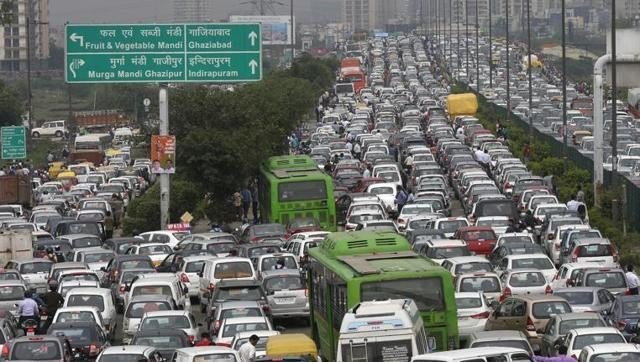Union Minister for Road Transport and Highways, Nitin Gadkari, has announced a major initiative to combat the twin challenges of pollution and traffic congestion in Delhi. Speaking at the Times Network India Economic Conclave in New Delhi, Gadkari revealed that the government is working on a Rs 65,000 crore project aimed at improving air quality and alleviating traffic woes in the national capital.
The Minister admitted that the Transport Department contributes significantly to pollution, responsible for around 40 percent of the country’s emissions. He emphasized that this new project would not only tackle the growing traffic jams but also address the pollution levels that have plagued Delhi for years. One of the major contributors to Delhi’s pollution is the practice of stubble burning in neighboring states like Punjab, Haryana, and parts of Uttar Pradesh, where farmers burn rice straw after harvesting. Gadkari highlighted that approximately 200 lakh tonnes of stubble are burned annually, contributing significantly to air pollution in Delhi. To combat this, the Ministry has launched a project in Panipat, which converts rice straw into valuable biofuels. This includes producing ethanol, bio-vitamins, and bio-aviation fuel from the stubble. Currently, 40 out of 400 such projects have been completed, successfully reducing the stubble burning by processing 60 lakh tonnes of it into cleaner alternatives.
The Minister also noted that he had instructed Punjab officials to create a system where stubble could be used to generate value, offering farmers Rs 2,500 per tonne for the stubble, thereby providing a financial incentive to reduce burning. He expressed confidence that the problem of stubble burning could be solved within the next two years.
On the broader issue of pollution, Gadkari emphasized the importance of reducing reliance on fossil fuels. He pointed out that India’s fossil fuel imports cost the country approximately Rs 22 lakh crore annually, a figure the government hopes to reduce by promoting the use of alternative fuels and electric vehicles. As the cost of lithium-ion batteries continues to decrease, reaching $100 per kilowatt-hour, the minister anticipates that electric vehicles will become more affordable, reducing the cost of diesel and petrol-powered vehicles. This rapid shift to electric and biofuels, according to Gadkari, is set to not only help the environment but also boost India’s economy by creating new industries and driving down pollution. The push for sustainable energy solutions is part of the government’s broader effort to build a cleaner, greener future for India. Nitin Gadkari’s ambitious project is poised to make a significant impact on both traffic management and air quality in Delhi, contributing to the government’s goal of reducing pollution and fostering sustainable development through innovation in biofuels and electric vehicles.




